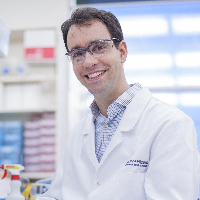Lead researcher
A/Prof Oliver Sieber and Prof Robyn Ward

Institution
The Walter and Eliza Hall Institute of Medical Research
Tumour type:
Bowel
Years funded
2014-2016
Project description
The risk of relapse from bowel cancer is predicted at the initial cancer stage but many patients are under or over treated. More accurate predictors for prognosis and benefit from therapy are required to guide treatment delivery and improve patient outcomes.
In this study, we have tested a number of less frequently mutated genes to find out their association with patient outcome.
We have evaluated the role of our candidate genes in cancer cell growth using human bowel cancer lines, identifying a strong tumour suppressor candidate which we will now use in further studies.
Our data have provided new insights into the molecular pathway contributing to bowel cancer progression. Cancer genes associated with prognosis and/ or therapy benefit have the potential to improve the personalisation of bowel cancer treatment and to improve patient outcomes.
What is the need?
Bowel cancer affects over 16,000 Australians each year. Surgical resection of the primary tumours is often possible, in many cases followed by chemotherapy treatment, yet about 50% of patients relaps. Finding molecular biomarkers to improve prediction of patients prognosis and whether they'll benefit from chemotherapy would have a substantial impact on treatment decisions.
Personalised outcome predictions would aid the identification of patients who will benefit most and indicate those in whom little utility is predicted, thereby minimising toxicity and cost associated with overtreatment.
What impact will this research have?
Our patient cohort study has highlighted the prognostic value of the APC gene mutation status in patients with right-sided bowel cancer, identifying individuals who tend to show particularly poor outcomes.
Furthermore, our analyses on human bowel cancer cell lines has indicated a promising new tumour suppressor gene candidate which is currently being followed up in further studies, providing novel insights into fundamental tumour biology.
Identification of tumour gene mutations, which can help predict disease prognosis and therapy response, will help identify patients at high risk relapse. This will enable patients and clinicians to make more informed decisions about chemotherapy and long-term follow-up care, identify individuals likely to gain benefit from treatment, and avoid the toxicities and cost associated with unnecessary exposure.
"Finding molecular biomarkers to improve prediction of patient prognosis and whether they'll benefit from chemotherapy would have a substantial impact on treatment decisions."